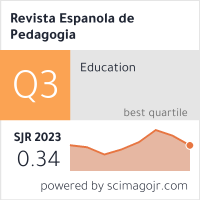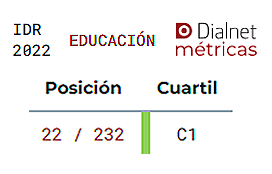Rethinking educational research: from linear relationships to the complexity paradigm
Abstract
Educational research in recent decades has been characterized by an excessive emphasis on empiricism based on linear cause-effect relationships between variables. Recognizing the significant progress that empirical research has brought on school quality, the question arises whether its quality can truly be assessed and improved without regard to its intrinsic and contextual complexity. To answer this question research on school effectiveness is compared with the more holistic conception from the paradigm of complexity and chaos theory. Thus, the analysis of the meaning of complexity leads us to argue that the nature of the school is not analytic, stable and orderly, but systemic, dynamic and changing; so it requires a new narrative that teaches us to read and understand the roads that run between order and disorder in each educational process. Technical advances in computer simulation allow social researchers to move from the subjective metaphor to the use of a methodology of nonlinear systemic models that allows an interesting experiment of dynamic effects between variables, including key factors such as time. Arturo Galán, Marta Ruiz-Corbella, Juan Carlos Sánchez Melado â?
Educational research in recent decades has been characterized by an excessive emphasis on empiricism based on linear cause-effect relationships between variables. Recognizing the significant progress that empirical research has brought on school quality, the question arises whether its quality can truly be assessed and improved without regard to its intrinsic and contextual complexity. To answer this question research on school effectiveness is compared with the more holistic conception from the paradigm of complexity and chaos theory. Thus, the analysis of the meaning of complexity leads us to argue that the nature of the school is not analytic, stable and orderly, but systemic, dynamic and changing; so it requires a new narrative that teaches us to read and understand the roads that run between order and disorder in each educational process. Technical advances in computer simulation allow social researchers to move from the subjective metaphor to the use of a methodology of nonlinear systemic models that allows an interesting experiment of dynamic effects between variables, including key factors such as time.
Citación recomendada | Recommended citation
Galán, A.,
Ruiz-Corbella, M.,
&
Sánchez Melado, J. C.
(2014)
.
Rethinking educational research: from linear relationships to the complexity paradigm.
Revista Española de Pedagogía, 72(258).
https://www.revistadepedagogia.org/rep/vol72/iss258/13
Licencia Creative Commons | Creative Commons License
Esta obra está bajo una licencia internacional Creative Commons Atribución-NoComercial 4.0.
This work is licensed under a Creative Commons Attribution-NonCommercial 4.0 International License








